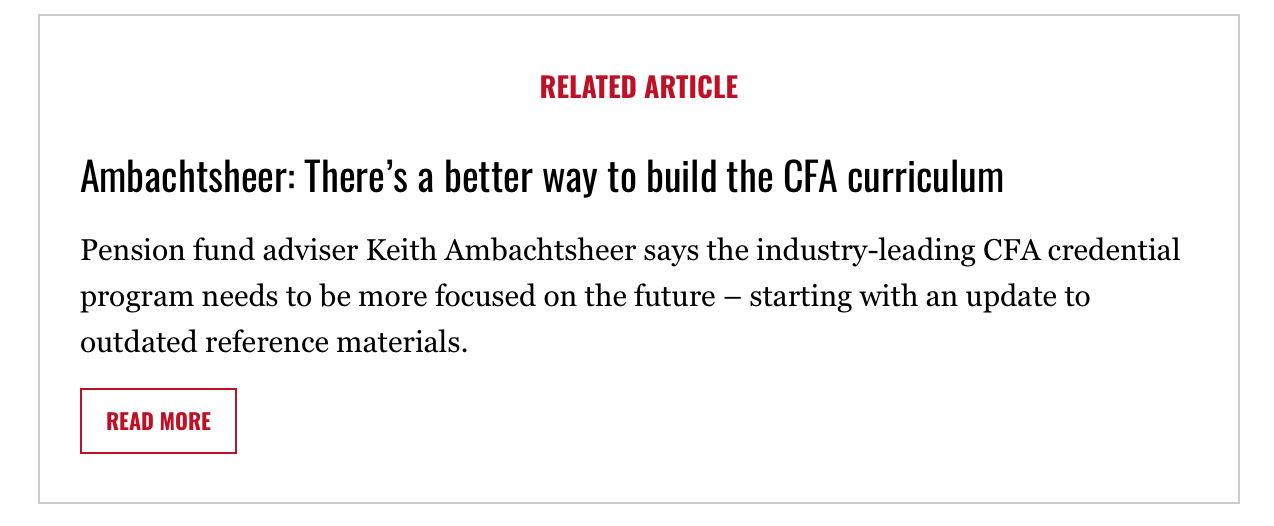We are grateful that thought leaders like Keith Ambachtsheer take the time to review the CFA curriculum and provide feedback. His perspective is precisely the kind of input on which we rely to design the curriculum and that will help improve what we teach future investment management practitioners.
Ambachtsheer is correct in noting that some of the data and examples used in the CFA curriculum are dated. Maintaining a nearly 9000-page curriculum is challenging, and it can take five years to revisit a particular reading. To identify the knowledge, skills and abilities that are necessary for today’s and tomorrow’s investment management professionals, we conduct a continuous process called practice analysis. This involves gathering input from practitioners around the globe to guide us in prioritising the areas of the curriculum that need to be revised to ensure that the CFA program maintains its status as the gold standard of investment management credentials.
About five years ago, in response to feedback that the Level III (the final level of the CFA program) curriculum was getting outdated, we embarked on a multi-year project of revamping it. Rather than merely revising existing readings, we completely redesigned the structure and content of the Level III curriculum. Unfortunately, Ambachtsheer reviewed last year’s version of the curriculum, which did not reflect these major revisions. In contrast, this year’s version includes seven new Level III readings that reflect the current practice of investment management; for example, we added in-depth coverage of liability-driven investing, which is particularly relevant to ensure adequate funding for pension plans. We are also adding content in other areas that are of increasing relevance to the practice of investment management, such as ESG, fintech, and goal-based investing.
Over the last five years, the revamp of Level III has been the focus of our curriculum development efforts, sometimes at the expense of doing the regular maintenance on readings that remain practically relevant and structurally sound but that would benefit from updates of data and examples. This is an issue to which we have turned our attention, with the objective of being more systematic in keeping the CFA curriculum up to date.
For the future
Ambachtsheer questions whether the CFA curriculum is future-oriented enough. CFA Institute is more than the CFA program and we rely on more than the curriculum to achieve our mission of leading the investment management industry by promoting the highest standards of ethics, and professional excellence for the ultimate benefit of society. Moreover, the CFA program, like all credentialing programs, is designed primarily to reflect current practice. It is not the primary vehicle for thought-leadership and looking forward, except in areas where we advocate practice, rather than reflect it, such as ethics and professional standards.
As a leading professional organisation, CFA Institute is committed to lifelong learning. We offer our members, directly or via our network of CFA societies, a broad range of continuing professional development offerings. We are committed to examining issues of critical importance to the future health of the investment management industry and to its ethical practice, through lilications such as the CFA Institute Financial Analysts Journal, and CFA Institute Research Foundation material, along with white papers and research from our teams for advocacy and the future of finance. For example, we agree with Ambachtsheer that sustainability is a critical issue, and we have recently published several pieces on this topic, including Financial Analysts Journal articles on climate risk and a Research Foundation Handbook on sustainable investments. Thanks to the involvement and contributions of influential practitioners and academics such as Ambachtsheer, who sits on the CFA Institute future of finance advisory council, we have the opportunity to identify important trends and create or curate content that will help shape a better investment management profession. These contributions have guided the integration of sustainability content, such as ESG case studies and related materials, into the curriculum.
CFA Institute takes its role as a leading professional organisation seriously. We are committed to ensuring that the CFA curriculum remains practically relevant globally and that we continue to challenge the profession to be future-oriented and focused on the long term. We welcome feedback from all of those who, like Ambachtsheer, support these goals.
Stephen Horan is managing director and Barbara Petitt is head of curriculum and learning experience, at the CFA Institute.


